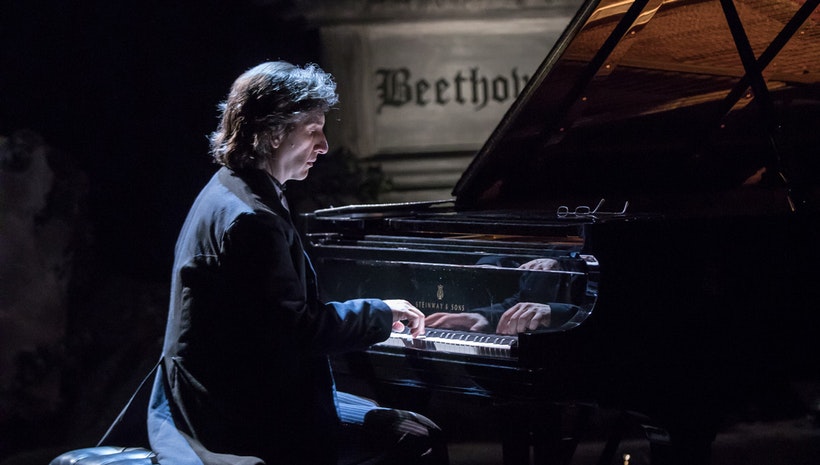Culled from a memoir of Dr. Gerhard von Breuning, Hershey Felder, actor, pianist, composer, presents a portrait of Ludwig van Beethoven (1770-1827). Felder takes on the role of the protean musician, as well as the doctor who had been the pre-adolescent constant companion of the ailing Maestro the last two years of his life. Beethoven’s compositions tapped his emotions and projected them straight into us (to paraphrase Greg Burk who eulogized another virtuoso recently departed Aretha Franklin.) Awe, majesty, wonder, contemplative or sad, by listening to or playing Beethoven we feel what he might have felt.
It does take a village to raise a prodigy or any other child. You could call this story a parallel tale of two neighboring and cultured families. The vulnerable Beethoven clan was beset with destabilizing issues while the Breuning clan were solid and a welcoming refuge. The latter unofficially adopted the Maestro from childhood until the end of his life.
Enrichment was mutual, a two way street. Young Ludwig’s pain was held by the Breuning’s while the Breunings’ existence was enhanced by Ludwig’s genius. For Beethoven having a safety net next door must have been healing, or at least a temporary respite from devastating deprivation at home. His mother doted but proved ineffective from the father’s brutal drunken rages. Repayment for the kindness were wages Beethoven earned through piano lessons for our narrator’s father and his siblings. In the process Ludwig and the senior Breuning became dear friends. They were both about 10 years old at the time Ludwig became the breadwinner of his family.
Fast forward 40 years and a chance meeting on the street reunites the old friends. Life often takes childhood companions on differing paths and people lose touch. Deaf, sick and disheveled the famous Beethoven is once again rescued by an elder Breuning. The senior Breuning was willing to drop old an old betrayal based hurt to return to the Maestro’s emotional and physical rescue. This time it’s our narrator as a youngster who benefited from tutoring in piano by the debilitated Maestro.
What is not finished will be revisited. Ironically, Breuning the younger is about the same age his father was when the young Beethoven gave him lessons. Another twist was our narrator, the younger Breuning a medical doctor like his father, reminiscing about and reflecting on the intertwining narratives, was the same age Beethoven and Breuning senior were when they reconciled their relationship. The upshot is that Beethoven found a safe haven in the Breunings’ world, and the Breunings’ world was informed by the Maestro’s brilliance.

Felder concluded his tour de force performance with a 4th wall busting audience Q and A at the Wallis. Still in costume Felder invited questions from the audience. One query in particular caught my attention. Is a misery inducing life a prerequisite for a preeminent artistic life? Not exactly was Felder’s answer. Challenges, he said, can be a catalyst to work harder with more hurdles to overcome.
For instance Beethoven’s deafness. His inability to hear his work played meant he was unavailable to incorporate feedback from audiences who praised him more than critics. This tuned out state may have fueled Beethoven to drill down on his singularity of innovation well ahead of the pack for eternity. Felder reminds us that Beethoven was a masterful story teller and virtuosic talent in the groundbreaking key of C minor with results enlarged over time eluding the vagaries of time.
Felder also ruminated on the cause of the Maestro’s deafness that continues to defy explanation. What resonates with me is the possibility, we will likely never able to prove, that the declining and then total loss of hearing if not primarily at least was a partial consequence of having been beaten as a child.

Beethoven’s remains have been exhumed and reburied three times. Beethoven was finally laid to rest, interred forever in Vienna’s main cementary with other musical greats drawn to or born in the city. The Maestro’s second grave site is now a children’s park. How fitting. Robbed of a carefree childhood his legacy allows for an urban oasis where kids are free to do their work and ‘play’ in the most rudimentary ways.

The show today is a reprisal of an earlier iteration of the show Hershey Felder’s, ‘Beethoven, As I Knew Him.’ The current version is a dramatization of a little known true story as told in 1870, 43 years after Beethoven’s passing that goes deeper into the material according to Felder. With a narrative spanning several generations, Felder combines his acting, piano and musical analytical skills to bring to life the character of Ludwig van Beethoven as he existed through the eyes of one who knew him well.
Featuring some of the composer’s most famous works, including The Moonlight Sonata, The Pathetique Sonata, selections from Beethoven’s Symphonies Nos. 5 and 9, the Grosse Fugue, as well as a movement of Beethoven’s great Emperor Concerto, be prepared for a journey through time that will bring audiences closer to the genius of the maestro Ludwig van Beethoven himself.
Felder at the Wallis as Tchaikovsky has also done “George Gershwin Alone,” “Monsieur Chopin” and “Maestro: The Art of Leonard Bernstein.” Look forward to Felder as Claude Debussy in the Spring of 2019.
Originally published at onmogul.com


